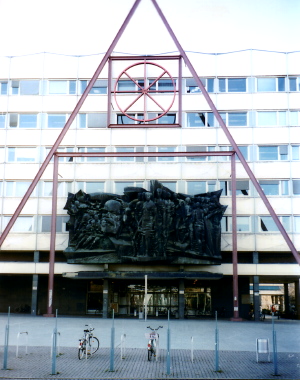University of Leipzig
|
|
The University of Leipzig, located in Leipzig, Germany, is one of the oldest universities in Europe. It was founded in 1409, and was originally comprised of four faculties. While part of East Germany, it was called Karl-Marx-university (KMU). Today it has grown to 14 faculties, and with over 29,000 students, is Saxony's second-largest university. Since its inception the university has enjoyed almost 600 years of uninterrupted teaching and research. There are now more than 150 institutes and the university offers 190 study programs leading to a diplomas, Master's degrees and teaching qualifications. Arguably, the Faculty of Medicine is the university's most renowned faculty.
| Contents |
History
The 'Alma mater Lipsiensis' opened on 2 December 1409 after it had been officially endorsed by Pope Alexander V in his Bull of Acknowledgment on 9 September 1409. Its first rector was Johann von Münsterberg.
Faculties
The original four facilities were the Faculty of Arts, Theology, Medicine, and Law. Today, the university comprises the following 14 faculties.

Main entrance to the University of Leipzig with relief of Karl Marx
and the memorial to the demolished university church
- Faculty of Theology
- Faculty of Law
- Faculty of History, Art and Oriental Studies
- Faculty of Philology
- Faculty of Education
- Faculty of Social Sciences and Philosophy
- Faculty of Economics and Management (incl. Civil Engineering)
- Faculty of Sports Science
- Faculty of Medicine (and a University Hospital)
- Faculty of Mathematics and Computer Science
- Faculty of Biosciences, Pharmacy and Psychology
- Faculty of Physics and Earth Science
- Faculty of Chemistry and Mineralogy
- Faculty of Veterinary Medicine
People associated with the University of Leipzig
The University of Leipzig in the past has attracted a number of renowned scholars. Among the great minds that shaped the profile of the university are:
- chemist Wilhelm Ostwald
- economist Karl Bücher
- economist Wilhem Roscher
- educationalist Theodor Litt
- germanist Theodor Frings
- Greek scholar Petrus Mosellanus
- historian Karl Lamprecht
- historian Walter Markov
- historian Wilhelm Maurenbrecher
- neurologist Paul Flechsig
- philologist Johann Christoph Gottsched
- philosopher Ernst Bloch
- philosopher Christian Thomasius
- physicist Werner Heisenberg
- physicist Gustav Ludwig Hertz
- psychologist Wilhelm Wundt
- romanist Werner Krauss
- theologian and poet Christian Fürchtegott Gellert
The following illustrious students spent their earlier years at Leipzig.
- Georg Agricola, mining engineer and natural philosopher
- Marc Bloch, French historian
- Émile Durkheim, French sociologist
- Kurt Albert Gerlach, Sociologist
- Johann Wolfgang von Goethe, poet
- Ulrich von Hutten writer and political leader
- Erich Kästner, author
- Gotthold Ephraim Lessing, Philosopher and writer
- Lin Yutang, writer
- Thomas Müntzer, political leader and theologian
- Friedrich Nietzsche philosopher
- Samuel Pufendorf, Historian
- Robert Schumann, composer
- Richard Wagner, composer
- Carl Friedrich von Weizsäcker, physicist and philosopher
- Gustav Zeuner, physicist and engineer
See also
External links
- Official website (http://www.uni-leipzig.de/)de:Universität Leipzig
